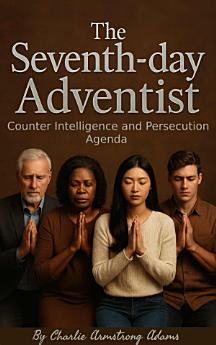The Seventh-day Adventist Counter Intelligence and Persecution Agenda
About this ebook
How Babylon’s Deep State Targets the Remnant with Surveillance, Psychological Warfare, and Doctrinal Suppression
Are faithful Seventh-day Adventists being systematically watched, isolated, and silenced? This explosive book says yes—and it presents the evidence.
From covert digital surveillance and rogue cell towers to engineered church conflict, false allegations, and moral entrapment, this book exposes how modern intelligence tactics are being used to dismantle those who preach the Three Angels’ Messages and expose Rome’s prophetic role in end-time events.
Drawing on real-world testimonies, spiritual insights, and historical parallels—from the Jesuit Counter-Reformation to COINTELPRO—this book reveals:
How Adventist believers are profiled, tracked, and targeted without due process
Why church leadership often aligns with external powers to suppress truth-tellers
The psychological operations used to destabilize marriages, ministries, and local congregations
How laws meant to protect vulnerable people are now weaponized against faithful witnesses
Why spiritual sabotage often masquerades as “mental health concern” or “unity enforcement”
This is not a conspiracy theory—it is a prophetic reality. And it’s happening now.
The Seventh-day Adventist Counter Intelligence and Persecution Agenda is the first volume in a two-part series. It uncovers the strategies of Babylon’s war against God’s remnant. The second book, Faith Under Siege: How to Endure, Resist, and Finish the Work, will equip readers with the tools to spiritually survive and overcome.
If you’ve felt the pressure… seen the signs… or faced the silence—you’re not alone.
The war is real. The remnant is targeted. But the Lamb still wins.
About the author
Charlie Armstrong Adams is an independent researcher and writer with a deep interest in investigative journalism, religious liberty, and state surveillance. With no formal platform or institutional backing, he documents patterns often overlooked—linking spiritual truths with real-world tactics of control and suppression. His work is shaped by personal experience, historical inquiry, and a conviction that truth must be spoken, even when inconvenient. Charlie writes not for recognition, but for clarity—for those willing to see behind the veil.







